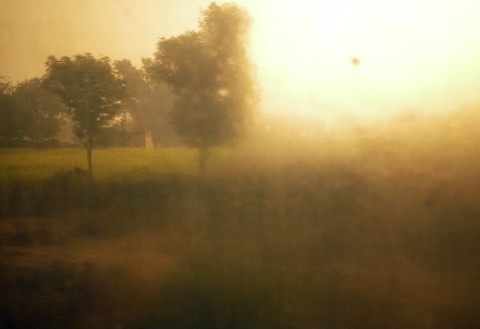One night I found that Cal’s left nipple had turned luminescent, milky-pale. The skin over the bottom knob of his spine developed the sheen of spilled gasoline. He quit soccer when the moon-colored skin hardening over his knees made it difficult for him to walk, much less run or kick.
When I cried, Cal grinned. “At least I’ll never have to shave again when it hits my face.”
“Stop cracking jokes. You sicken me,” I hissed.
“Exactly. Then we could be together,” he said, drumming his fingers on his useless knees. And that was the first time I realized he was afraid.
The official name was Ariel’s disease. An autoimmune illness akin to scleroderma, where the body attacks itself by turning the flesh of the bearer into something that resembles pearl. There was no rhyme or reason to who was struck. I knew children sickened at the school where I taught first grade, the elderly already in nursing homes, athletes and lawyers and janitors and even, once, a movie star. The disease, eventually, named after her.
Cal’s legs soon locked, then his arms. Random at first, soon the patches settled on traveling upwards. When we stopped being able to have sex, I took to studying the progress of the disease on his body. I kissed a trail up his stiff thighs, his skin oddly slippery against my lips. He wouldn’t speak during these times, his head thrown back, his eyes closed. The street lamps outside our window made him iridescent. For a while I pretended we were underwater, that he was a lost treasure, a marble statue, perhaps, from Athens. That the moonlight was the sun, struggling through leagues of still sea. Then, one night, he breathed into my hair that he could no longer stroke, “Let’s stop.”
My beautiful, beautiful Cal.
His stomach. His chest. The dime-sized birthmark on his right shoulder blade. His neck. At that point, he would either be lying in bed or propped against a vertical surface so he could at least see outside the window.
“That fat fucker is eating our birdseed again,” he’d say, blinking at the squirrel scurrying away from our birdfeeder.
Or, “Say, remember that barbecue we threw Fourth of July two years ago? When Mike from the office vomited into your azaleas? And Marilyn paid us back in carrot cake for, like, a month?”
Then the pearl settled around his mouth, and he could no longer speak.
His chin. His lips, which I kissed without fail, each morning and night, though they were cool, so cool, against my own. His hair, falling off his scalp in handfuls before being replaced by whorls of pearl. His cheekbones, high and sharp enough to cut myself on, now glinting like ceramic knives.
The last day, when only his eyes were left, he blinked. It was time. When we first learned of his prognosis, he had settled his will, his last wishes. How he wanted to go.
Mike from the office came by with Marilyn. Together we heaved him onto the deck. I couldn’t stop gasping whenever we jostled him, even though Cal had assured me time and time again that he stopped feeling much of anything once the pearl took over his body.
I thought he would want to go to the beach where he spent his childhood summers, to be tossed about by the waves, or to his favorite hiking trail from his backpacking youth, to be heaved over a waterfall. But the only place he wanted to go was the backyard.
“It’s our home, Andie,” he said, when he’d still been able to lean over, kiss my hand.
We laid him on a soft patch of grass. Mike and Marilyn stepped into the house as I untied his hospital gown. He was beautiful, so beautiful, my Cal. His skin white in one glance, a rainbow in another with a shift of light. I squatted, tickling his nose with a piece of grass. He used to hate being tickled, though he’d often dissolve into laughter.
“What do you see, Cal?” I asked. The sun was at its apex, burning white, alighting Cal. Light bouncing off his feet, his wrists, his shoulders, the bellybutton I loved so much. The bump of his nose. The dent in his forearm that was once a scar, stitched up after a bad fall at the pool. The chronic bruises on his shins from soccer. The pearl had smoothed all of this away.
He closed his eyes, then opened them again. An eyelash drifted down the luminous plane of his cheek, then lay still. I leaned over to blow it away, my hair curtaining his head. When I breathed out, it was warm inside, secret. It was almost like being undersea again, the light struggling through the deep. I could pretend we were sinking together, that we could drift down to the darkest reaches, not floating on the surface alone, my sight blinded by the reflection of the sun.



 The core workshop of SmokeLong Fitness is all in writing, so you can take part from anywhere at anytime. We are excited about creating a supportive, consistent and structured environment for flash writers to work on their craft in a community. We are thrilled and proud to say that our workshop participants have won, placed, or been listed in every major flash competition. Community works.
The core workshop of SmokeLong Fitness is all in writing, so you can take part from anywhere at anytime. We are excited about creating a supportive, consistent and structured environment for flash writers to work on their craft in a community. We are thrilled and proud to say that our workshop participants have won, placed, or been listed in every major flash competition. Community works.